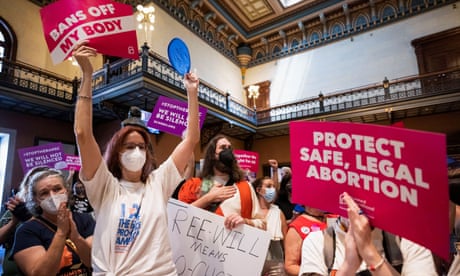Here's a summary of the current discussion of brain death (and its possible connection to the debate on whether a fetus is a living person), in JAMA. Maybe it will reach some resolution this year...
Truog, Robert D., and David C. Magnus. The Unsuccessful Effort to Revise the Uniform Determination of Death Act. JAMA. 2023;330(24):2335–2336. doi:10.1001/jama.2023.24475
"In 1968, a Harvard committee proposed a new approach for determining death, one based on the irreversible loss of neurological functions.1 This concept was instantiated into law in 1980 when the Uniform Law Commission endorsed The Uniform Determination of Death Act.2 The act, which a large majority of states have adopted in whole or with some variations, says, in part, that an individual is dead if the individual has sustained (1) irreversible cessation of circulatory and respiratory functions, or (2) irreversible cessation of all functions of the entire brain, including the brain stem. A determination of death must be made in accordance with accepted medical standards.
"In 2020, the commission was asked to consider updating the act, based in part on concerns that the act does not fully align with current medical practice.3 A draft of its revision was presented and discussed at the commission’s annual meeting on July 26, 2023.4 Herein, we summarize the major issues that led to the decision to draft a revision, the alternatives that were considered, why there was failure to reach consensus, and what this means for the future.
"The Uniform Determination of Death Act defines neurological death, commonly known as brain death, as the complete absence of all functions of the entire brain. The current diagnostic criteria, however, test for only a subset of brain functions, and most notably do not include testing for neurosecretory hypothalamic functions, which are retained by many patients who have been diagnosed as brain dead.5 In addition, the law requires the “irreversible” cessation of biological functions, whereas in practice the standard has been “permanence,” with the distinction being that irreversible implies that the function cannot be restored, whereas permanence means that the function will not be restored because no attempt will be made to do so.
...
"n order for medical practice to be in compliance with the law, the commissioners considered either changing the guidelines to conform with the law, or changing the law to conform with the guidelines. Under the first approach, the guidelines would require physicians to diagnose the irreversible cessation of all brain functions, not just selected functions. This would be challenging, given the difficulty of detecting and measuring all of the brain’s many functions. Alternatively, the law could be revised to be coherent with current practice guidelines. At the annual meeting of the Uniform Law Commission, the committee considered the following draft alternative to the existing Uniform Determination of Death Act4: “An individual is dead if the individual has sustained: (1) permanent cessation of circulatory and respiratory functions; or (2) permanent (A) coma, (B) cessation of spontaneous respiratory functions, and (C) loss of brainstem reflexes.”
"This proposal would harmonize the law with the practice guidelines. Instead of requiring the absence of all brain functions, this revision would have required only the absence of specific brain functions, namely the capacity for consciousness and spontaneous respiration.
"The proposed revision also would have replaced the requirement for irreversible cessation with permanent cessation, thereby anticipating the trajectory of new developments in resuscitation research, including work demonstrating the potential for restoration of neuronal function in brains, even many hours after the loss of brain perfusion.6 Using the permanence standard, death can be determined in these patients on the grounds that function will not be restored rather than the requirement that it cannot be restored.
"Finally, the proposed revision also included a section that would have required hospitals to respect the refusal of patients or their surrogates to having death determined by neurological criteria. This position was supported by various constituencies, including the Catholic Medical Association, as well as several of the Uniform Law Commission commissioners, who saw it as a way to respect the diversity of opinions surrounding the determination of death while still supporting the concept of brain death. At the same time, this approach was strongly condemned by most mainstream physician and transplant organizations, given the burden that it would place on hospitals and intensive care units and its potential negative impact on organ procurement.
...
"in an email on September 22, 2023, the committee leadership announced that they had decided to pause the process, saying that “although we will continue to hope mid-level principles will become apparent, no further drafting committee meetings will be scheduled at this time.”
"Perhaps this outcome could have been predicted from the beginning, given the polarization that has evolved in the US around issues at the beginning and end of life. Commissioner James Bopp emphasized these connections in asserting that the controversies around brain death and abortion are an “identical debate, just in a different context.”7
###########
Earlier:




